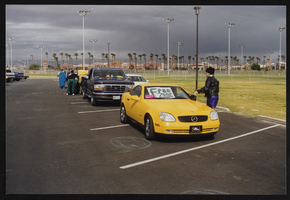Search the Special Collections and Archives Portal
Search Results
Lloyd Bell oral history interview
Identifier
Abstract
Oral history interview with Lloyd Bell (born 1925 in Los Angeles) conducted by Joseph Butner on September 18, 1973 for the Ralph Roske Oral History Project on Early Las Vegas. Lloyd discusses the challenges of policing Las Vegas, Nevada where the population includes both permanent residents and tourists, and he mentions the issue of drug and narcotics addiction in the city as it relates to crime. Lloyd then talks about the development and growth of Las Vegas, as well as the environmental and social changes in the city. The interview then shifts to a discussion on the significance of legal gambling in Las Vegas, which then moves to a related discussion on the existence of organized crime in Las Vegas.
Archival Collection
Lucile Nyberg oral history interview
Identifier
Abstract
Oral history interview with Lucile Nyberg conducted by Alison Hartough on February 22, 1978 for the Ralph Roske Oral History Project on Early Las Vegas. In this interview, Nyberg discusses the history of Overton, Nevada and life in the town. Nyberg describes early Las Vegas, Nevada and life in Boulder City, Nevada. Nyberg goes on to discuss her career as a teacher and the changes made to education in Las Vegas. Nyberg also discusses the development and the economy of Las Vegas, and briefly discusses prostitution in the city. Nyberg's husband, Richard Nyberg, is present during the interview, but does not speak.
Archival Collection
Elbert B. Edwards oral history interview
Identifier
Abstract
Oral history interview with Elbert Edwards conducted by Roger Armstrong on June 30, 1975 for the Ralph Roske Oral History Project on Early Las Vegas. Edwards discusses his life in Panaca and Lincoln County, Nevada. He also talks about Native Americans, Mormonism, and Meadow Valley, Nevada. He discusses the Bennett-Arcan Party, a Death Valley party involved with the 1840s’ gold rushes, and its members.
Archival Collection
Alice Brown oral history interview
Identifier
Abstract
Oral history interview with Alice Brown conducted by Claytee White on October 19th, 2005 for the UNLV @ 50 Oral History Project. In this interview Alice speaks about how her husband took a job at a titanium plant, so their family moved to Las Vegas, Nevada and she began working at the University of Southern Regional Division (now University of Nevada, Las Vegas). She gives detailed memories of the university campus, library, faculty, and staff from the 1960s era.
Archival Collection
Rowena Gonzalez oral history interview
Identifier
Abstract
Oral history interview with Rowena Gonzalez conducted by Michael Boyd on March 01, 1977 for the Ralph Roske Oral History Project on Early Las Vegas. Gonzalez first talks about her family background and residential history before discussing the way of life in Texas and eventual move to Las Vegas, Nevada. Several topics covered in the interview include Gonzalez’s recollections of the atomic testing, the building of the Boulder (Hoover) Dam, and Howard Hughes. The two also discuss tourism, the properties on the Strip and in Downtown Las Vegas, and early means of transportation.
Archival Collection
Alfred Guzman oral history interview
Identifier
Abstract
Oral history interview with Alfred Guzman conducted by Barbara Guzman on March 01, 1981 for the Ralph Roske Oral History Project on Early Las Vegas. Guzman first talks about his occupational history, including his career in public relations for the Sands Hotel and Casino. He then talks about Las Vegas, Nevada, including social changes, changes in the gaming industry, and mob influence in the casinos. He also talks about Reno, Nevada, how his job affects the public, and the MX Missile system.
Archival Collection
Hazel F. DuBarton oral history interview
Identifier
Abstract
Oral history interview with Hazel F. DuBarton conducted by Anne DuBarton on November 13, 1979 for the Ralph Roske Oral History Project on Early Las Vegas. This interview covers DuBarton’s recollection of Las Vegas, Nevada history, including the local politics, nuclear testing, and the Helldorado Parade. DuBarton also discusses the various occupations that she had including dress designer, dressmaker, clerk, bookkeeper, hotel manager and an arts and crafts camp instructor for Campfire Girls.
Archival Collection

Freezone nightclub float at the second annual Gay Pride parade, image 002: photographic print
Date
Archival Collection
Description
Image
Barbara Mowry oral history interview
Identifier
Abstract
Oral history interview with Barbara Mowry conducted by Jon Sedlacek on February 16, 1979 for the Ralph Roske Oral History Project on Early Las Vegas. In this interview, Mowry describes moving to Las Vegas, Nevada from California in 1949 to get a divorce, before remarrying and entering into the restaurant business with her new husband. Mowry discusses buying an established restaurant, the Villa Venice, with her husband, and the eventual fire that would destroy the restaurant in 1952. Mowry describes running the restaurant, the different kinds of recreation in Las Vegas during the 1950s, and how Las Vegas has changed since she moved there. Mowry also discusses the prejudice against African Americans in Las Vegas, and how her husband would have to let in African American performers such as Sammy Davis Jr. or Pearl Bailey through the back door of their restaurant.
Archival Collection
Bonita Coleman oral history interview
Identifier
Abstract
Oral history interview with Bonita Coleman conducted by Claytee D. White on February 22, 2013 for the African Americans in Las Vegas: a Collaborative Oral History Project. Coleman discusses her early life in St. Joseph, Louisiana. She shares her experiences helping to raise her 8 siblings while her mother worked to support her family. Coleman briefly discusses the historical race relations of St. Joseph in the 1950s and 1960s from her own experiences growing up. In 1968, she moved to Las Vegas, Nevada, joining her aunt and sister who had moved here in 1960. Coleman recalls the start of her career in the hospitality industry, and shares what she remembers of her family members' jobs since they all worked in the industry as well.
Archival Collection
